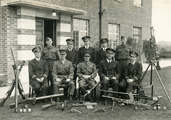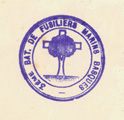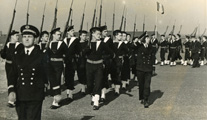- Lieutenant Commander Servando Marenco Reja, head of the Third Battalion of Naval Fusiliers.
- Lieutenant Commander Juan de Arce Mayora, chairman of the Recruitment Committee.
- First-Class Medical Doctor Angel de Agirretxe Goikoetxea, chief medical officer of the Third Battalion of Naval Fusiliers.
- First-Class Sub-Lieutenant Jos├® Mar├Ła Abizanda Ballabriga.
- First-Class Sub-Lieutenant Antonio Gonz├Īlez Garc├Ła.
- Second-Class Sub-Lieutenant Juan de Basabe Arrazola.
- Cadet Servando Marenco Delgado.
With President Aguirre in hiding since May 1940 and his ministers operating underground following the German invasion of France, the Basque Government's administrative machinery was in complete disarray. Only its overseas delegations continued to operate. Under these circumstances, several members of the PNVŌĆÖs ruling council (EBB) in England, together with Manuel de Irujo ŌĆōformer minister in the Republican government and MNV member of parliamentŌĆō and the London delegate, Lizaso, decided to create an interim body to fill the gap created by the absence of the lehendakari and his ministers and to take on the work of government. The body was set up on 11 July, 1940 under the name of the National Council of Euzkadi[Consejo Nacional de Euzkadi-Euzkadi'ko Batzar Nagusia].
The National Council offered to collaborate with the British government but the proposal was turned down. The progress of the war had made it necessary to pursue a policy of appeasement towards Franco. Britain, now the last bulwark of the ŌĆ£western democraciesŌĆØ fighting Nazism, had no desire to add to its enemies. At all costs it needed to prevent Franco's SpainŌĆÖs from entering the war and attacking the strategic base at Gibraltar. Any action that might be interpreted as a recognition of the Basque national issue was in danger of provoking a hostile response from Franco.
On the recommendation of the British, the National Council began contacts with the Free French and soon found that the French were equally interested in establishing closer relations. The negotiations to draw up a collaboration agreement lasted six months and the pact was finally signed on 17 May, 1941. There were three particularly significant aspects to the agreement: enlistment of Basque volunteers into a unit of the Free French Forces, economic and commercial co-operation and collaboration of the Basque Information Services with the French.
THE CREATION OF A BASQUE MILITARY UNIT
From the outset, the British Government had misgivings about the pact and asked the French to keep it secret and to suspend full application provisionally. Despite these restrictions, however, the Basque National Council tried to implement some elements of the pact. On 11 June, Manuel de Irujo sent a telegram to De Gaulle proposing the formation of a Basque military unit within the Free French Forces. The idea was forwarded to the Army Chief of Staff who, however, turned it down. The proposal was then sent on to the Navy. The commander of the Free French Naval Forces (FNFL), Vice-Admiral Muselier, responded very positively and was to become one of the leading backers of the scheme.
The maximum discretion had to be exercised in recruiting volunteers. On 24 July, Captain Moret, Chief of Staff of the FNFL, entered contacts with officers who had offered their services to the National Council of Euzkadi. Some were of Basque origin and others were anti-Negrin republicans who saw in Manuel de Irujo, former minister of the Republic, a link with the legitimacy of the Republic. On 10th September he sent Lizaso the list of officers for the new unit. On the following day, the Third Battalion of Naval Fusiliers of the FNFL was created.
The selected officers were awarded ranks in the FNFL one or two below those they had held in the Republican army. The list of officers was as follows:
As a fluent English and Spanish speaker, First-Class Sub-Lieutenant Philip Kieffer (who later went on to create the Navy commandos) was appointed liaison officer. Later additions included the administration officer Antonio Gamarra Calvo who joined the Recruitment Committee in November 1941; Lieutenant Rosendo Pi├▒eiroa Plaza, in January 1942, shortly followed by First-Class Sub-Lieutenant Julian Hickman Urrutia and Antonio Vera.

At the same time, Moret sent Lizaso the Battalion Regulations. These stipulated that the language of command would be French; Spanish would be used within the battalion, while in sections comprised of Basque speakers, orders could be given in Basque. They also authorised the use of particular flags and insignia that might encourage recruitment or add to the prestige of the unit.
All officers had acquired experience in the Civil War and only required complementary training and an understanding of the Allies' resources and methods. During the following months they took courses in the use of light arms and landing operations. In the meantime, the first volunteers, all Latin American, arrived at the Battalion's barracks in Camberley. Some were of Basque origin, others came from families with a French cultural tradition and others were simply sympathetic to the Allied cause and preferred to serve in a Spanish-speaking unit. The volunteers enlisted through the Free French delegations in their own countries or came from other positions within the FFL. As it was finally constituted, the Battalion was made up of Basque and Spanish officers and troops of Latin American origin.
Once the preparation courses had been completed, the two Marencos, father and son, were posted on a special mission in Brazzaville, where they were to reconnoitre German activities in Spanish possessions in Equatorial Guinea. They were ordered to make contact with Basques in the colony, with a view to gathering intelligence and drawing up a list of allied sympathisers, who might be useful to their purposes. No direct military action was to be embarked upon unless Spain entered the war. However, it took the officers a considerable time to reach Brazzaville and upon their arrival, they scarcely had time to carry out their mission before the battalion was disbanded in 1942 and they were obliged to return.
When Marenco left for Africa, he was replaced at the head of the Battalion by Lieutenant Commander Arce. In January 1942 the first company was formed under the command of Lieutenant Pi├▒eiroa. On 14 February, Captain Moret reviewed the troops and presented the volunteers with the new battalion insignia. The first insignia used had been a small Basque flag (or Ikurri├▒a) worn on the left-hand side of the chest. The definitive version reproduced a white cross on a red background over the oak tree of Gernika, combining the colours of the Basque flag, edged by the chains of Navarre. This time it was to be worn on the right-hand side of the chest, in the place habitually occupied by the Cross of Lorraine in the FNFL uniform.
DISBANDMENT OF THE BATTALION
However, British opposition meant that the Battalion's days were numbered. Officially, the Third Battalion of Naval Fusiliers was no more than a training unit of the FNFL. It was some months before the Foreign Officelearnt that it was actually a Basque unit. When it did, it prevented the Recruitment Committee from travelling to the Americas or telegraphing orders there. At a meeting with Lizaso on 6 January, De Gaulle himself informed him of the objections being raised by the British.
However elements within the FLF were also opposed to the project. De Gaulle's general staff was composed of right-wing officers, who saw these Spanish-speaking troops as a dangerously subversive element and did everything in their power to hinder recruitment. Several South American volunteers who had asked to enlist in the Battalion were incorporated into a French detachment that left for Africa, without having received any reply to their applications. The net result of all these obstacles was that the unitŌĆÖs numbers never exceeded 80 men.
Another development within Free France Forces also had a major impact on the battalionŌĆÖs fate. Differences between De Gaulle and Muselier had been ongoing since 1940 and on 4 March, 1942 De Gaulle finally relieved Muselier of control of the FNFL, replacing him with Rear-Admiral Auboyneau. This caused serious tension within the FNFL, with strikes, protests and resignations among the officers. Auboyneau finally assumed control on 20 April and on 15 May Muselier notified De Gaulle that his collaboration with him had ended.
Muselier had been the Basque BatallionŌĆÖs leading champion among the French forces. On 23 May, Admiral Auboyneau ordered disbandment of the Third Battalion of Naval Fusiliers. This decision had been taken by the French National Committee in light of "the position adopted by the British government which sees inconveniences in allowing a significant force of non-French nationals to be formed in its territory under a French flag, and invokes, in opposition to the very principle of recruitment currently underway, the Churchill-De Gaulle agreements". Volunteers were offered three alternatives: they could join the French Foreign Legion, the French Levante Battalion of Naval Fusiliers or demobilise.
The volunteers left their decision in the hands of Lehendakari Aguirre, who had again assumed charge of the Basque Government. He gave them freedom to act as they saw fit: most officers and some soldiers decided to remain in the Free French Forces, while the rest opted for demobilisation. Before the disbandment, General De Gaulle presided over a solemn parade of the Pi├▒eiroa company at the end of which he addressed them, saying: "I have had to order disbandment of the unit against my own will. It has been made necessary by reasons of a diplomatic nature. I am not in my own country. Had we been in France, no such order would ever have been given". In a private conversation he also said that the Duke of Alba, Franco's ambassador in London, had lodged a complaint with the Foreign Officeand this was the reason why the Basque unit had had to be disbanded.
Following the liberation of France in 1944, the British government notified both the French government and the Basque delegation that as far as it was concerned, both the suspension of implementation and the secrecy of the Franco-Basque agreement were lifted. This move had no practical effect since the situation that had given rise to the Pact had changed substantially. The path originally opened by the Third Battalion of Naval Fusiliers was then taken up by the Gernika Battalion.


